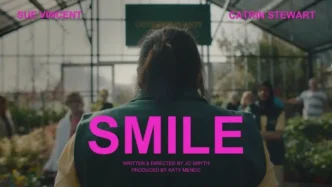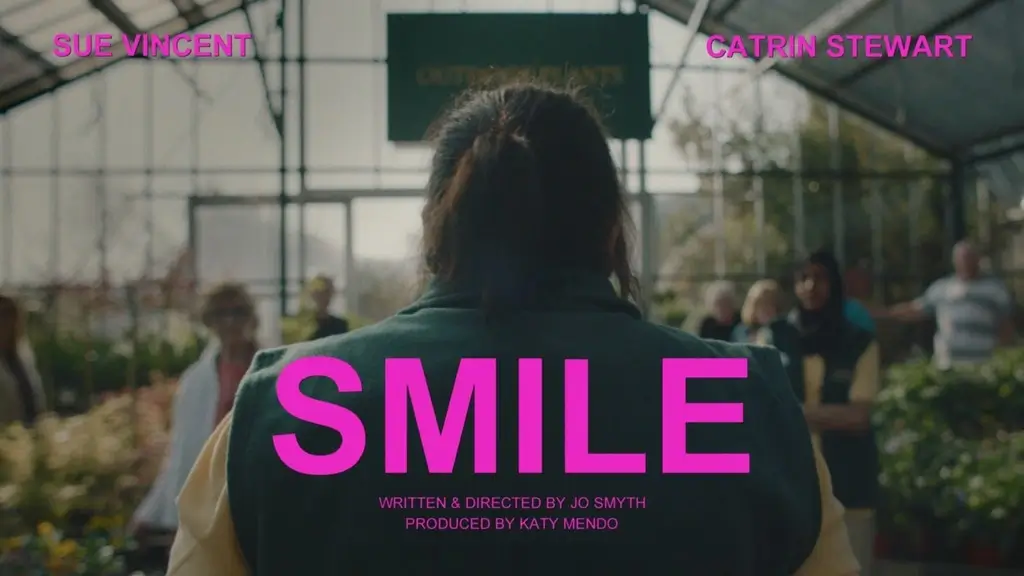Watch Smile (2022)—a poignant drama short film by Jo Smyth. A moving story that stays with you. Don’t miss it!
🙂 Smile (2022) — Drama Short Film by Jo Smyth
A taut, 14‑minute UK drama that stares misogyny and everyday sexism straight in the face — and refuses to look away. Written and directed by Jo Smyth, Smile follows one woman’s quiet but fierce fightback against a culture that too often excuses or ignores abuse.
🧭 Overview
- Genre: Drama / Social commentary
- Writer & Director: Jo Smyth
- Cast highlights: Sue Vincent (Sue), Catrin Stewart (Laura), Simran Bhandari (Chaturi), Bryn Hodgen (Jake), Gabin Kongolo (Nathan)
- Runtime: ~14 minutes
- Release date: 11 November 2022 (UK)
- Filming location: Pontypool, Wales
- Budget: Estimated £23,000
- Festival circuit: Selected for Aesthetica Short Film Festival 2023
📖 Story in Brief
Sue, a woman in her fifties, navigates the corrosive undercurrent of sexism that runs through her daily life. What begins as a seemingly ordinary day spirals into a confrontation with harassment and assault — moments that are all too familiar for many women. Instead of retreating, Sue finds a way to reclaim her agency, challenging the unspoken rules that expect her to “smile” and stay quiet3.
🛠️ Creative “Tools” & Vision
Jo Smyth’s approach draws on the immersive, character‑driven perspective of films like Sicario and Nomadland, keeping the camera close to Sue’s point of view so the audience experiences events as she does.
- POV storytelling: Forces viewers into Sue’s shoes, sharing her discomfort and outrage.
- Minimal dialogue: Lets body language, framing, and silence speak volumes.
- Flashbacks & visual cues: Inspired by We Need to Talk About Kevin to externalise inner turmoil without heavy exposition.
- Naturalistic performances: Ground the story in authenticity, avoiding melodrama.
✅ Pros & ❌ Cons
Pros
- 🎯 Urgent theme: Tackles harassment and sexism head‑on.
- 🎭 Strong lead: Sue Vincent delivers a layered, empathetic performance.
- 🎥 Immersive style: POV and visual storytelling pull you in.
- 💬 Conversation starter: Sparks dialogue on a pervasive social issue.
Cons
- ⏳ Short runtime: Leaves you wanting more exploration of Sue’s backstory.
- 🌀 Emotional intensity: May be confronting for some viewers — though that’s part of its purpose.
🌟 Key Features
- Feminist lens: Centred on a mature female protagonist — rare in shorts.
- Authenticity: Rooted in lived experiences and informed by work with women’s shelters.
- Collaborative craft: Crew includes emerging talents from major TV dramas (His Dark Materials, Sex Education).
- Awareness‑raising: Aims to keep public discussion on harassment alive.
🎯 Use Cases & Applications
- Education: Screen in gender studies or sociology courses to prompt discussion.
- Community events: Use as a catalyst for panels on safety and equality.
- Film craft study: Example of POV‑driven drama with minimal dialogue.
👥 Who Is It For?
- Social issue advocates: Those working to challenge sexism and harassment.
- Film students: Learning how to merge activism with narrative craft.
- Festival audiences: Viewers seeking powerful, conversation‑starting shorts.
💡 Humanized Takeaway
Smile isn’t about happiness — it’s about the demand for it, even in the face of harm. Smyth turns that demand into a mirror, showing how “just smile” can be a silencing tool, and how breaking that expectation can be an act of defiance.
🔍 Find More & Support
- IMDb page for Smile (2022) — full cast, crew, and production details.
- Greenlit project page — behind‑the‑scenes vision, funding story, and creative influences.
- Aesthetica Short Film Festival profile — director interview and thematic insights.
If you’d like, I can also create a scene‑by‑scene storyboard for Smile so you can “read” the film’s emotional beats visually without spoiling every detail. Would you like me to prepare that?

